Don’t miss this introductory look at artificial intelligence, including the concerns (and solutions to these concerns) for in-house counsel.
ISBA members, sign up to receive The Bar News' biweekly e-newsletter by emailing emailpreferences@isba.org
-
February 20, 2024 | CLE

-
February 20, 2024 | ISBA News
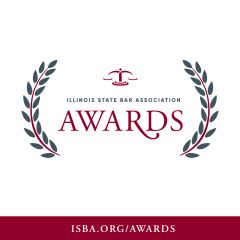 The deadline to nominate someone for an Illinois State Bar Association award is March 4, 2024.
The deadline to nominate someone for an Illinois State Bar Association award is March 4, 2024. -
February 16, 2024 | Practice News
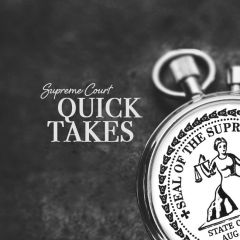 A leading appellate attorney reviews the Illinois Supreme Court opinion handed down Friday, February 16.
A leading appellate attorney reviews the Illinois Supreme Court opinion handed down Friday, February 16. -
February 15, 2024 | ISBA News
 View Illinois State Bar Associations' judicial ratings by county for March 19's primary election.
View Illinois State Bar Associations' judicial ratings by county for March 19's primary election. -
February 15, 2024 | CLE
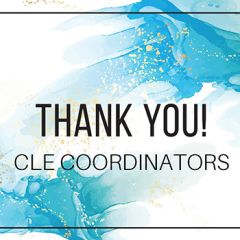 ISBA’s 15 hours of Free On-Demand CLE member benefit allow you to choose from over 700 hours of programming on a broad range of topics. This benefit results from the tireless efforts of many dedicated ISBA volunteer CLE program coordinators working with the ISBA CLE Committee and staff who plan and produce programs presented by our sections and committees. We proudly recognize those coordinators responsible for CLE programs presented during our Fall 2023 semester. Please join us as we thank them for all they do to enhance the profession!
ISBA’s 15 hours of Free On-Demand CLE member benefit allow you to choose from over 700 hours of programming on a broad range of topics. This benefit results from the tireless efforts of many dedicated ISBA volunteer CLE program coordinators working with the ISBA CLE Committee and staff who plan and produce programs presented by our sections and committees. We proudly recognize those coordinators responsible for CLE programs presented during our Fall 2023 semester. Please join us as we thank them for all they do to enhance the profession! -
February 14, 2024 | Practice News
 Insurance organizations partner to provide a complete suite of property and casualty insurance products to Illinois solo and small law firms. ISBA Mutual Insurance Company, the #1 insurer of Lawyers Professional Liability Insurance for law firms in Illinois, and Sidebar Insurance Solutions, Inc., an Orland Park based insurance agency specializing in structuring insurance programs for law firms have established a partnership to ensure that Illinois solo lawyers and small firms, have access to a comprehensive suite of insurance coverages to protect their firms.
Insurance organizations partner to provide a complete suite of property and casualty insurance products to Illinois solo and small law firms. ISBA Mutual Insurance Company, the #1 insurer of Lawyers Professional Liability Insurance for law firms in Illinois, and Sidebar Insurance Solutions, Inc., an Orland Park based insurance agency specializing in structuring insurance programs for law firms have established a partnership to ensure that Illinois solo lawyers and small firms, have access to a comprehensive suite of insurance coverages to protect their firms. -
February 13, 2024 | ISBA News
 At the March 2024 meeting of the ISBA Board of Governors, the Board shall elect two Under 35 delegates to the ABA House of Delegates, one from Cook County and one from outside Cook County. The candidates for these positions must be members of the ISBA and ABA in good standing, from the appropriate geographical area, and under the age of 35 at the close of the 2024 ABA Annual Meeting, which is Tuesday, August 6.
At the March 2024 meeting of the ISBA Board of Governors, the Board shall elect two Under 35 delegates to the ABA House of Delegates, one from Cook County and one from outside Cook County. The candidates for these positions must be members of the ISBA and ABA in good standing, from the appropriate geographical area, and under the age of 35 at the close of the 2024 ABA Annual Meeting, which is Tuesday, August 6. -
February 12, 2024 | Practice News
 In his article February Illinois Bar Journal article, “Crafting an Effective Generative AI-Policy,” Carlos Cisneros notes that among the risk factors of using generative online artificial intelligence tools are whether content entered into a generative-AI tool’s prompt becomes the property of the AI company and whether confidential and biometric information is protected after being entered into an AI system. With this in mind, Cisneros recommends that lawyers should verify whether use of AI is covered by their malpractice insurance policy.
In his article February Illinois Bar Journal article, “Crafting an Effective Generative AI-Policy,” Carlos Cisneros notes that among the risk factors of using generative online artificial intelligence tools are whether content entered into a generative-AI tool’s prompt becomes the property of the AI company and whether confidential and biometric information is protected after being entered into an AI system. With this in mind, Cisneros recommends that lawyers should verify whether use of AI is covered by their malpractice insurance policy. -
February 6, 2024 | CLE
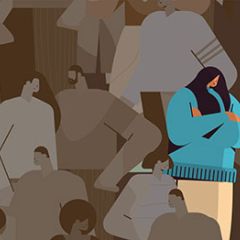 Upon release from prison, releases are generally not prepared to reenter their communities. And, unless society provides a support system, these individuals may be vulnerable to reengage in criminal pursuits to obtain food, shelter, and money, or to lapse into depression and anxiety (which further threatens their ability to reengage in society and even with their families). Don’t miss this opportunity to learn how you can help your client successfully integrate back into society after their time in prison.
Upon release from prison, releases are generally not prepared to reenter their communities. And, unless society provides a support system, these individuals may be vulnerable to reengage in criminal pursuits to obtain food, shelter, and money, or to lapse into depression and anxiety (which further threatens their ability to reengage in society and even with their families). Don’t miss this opportunity to learn how you can help your client successfully integrate back into society after their time in prison. -
February 6, 2024 | Practice News
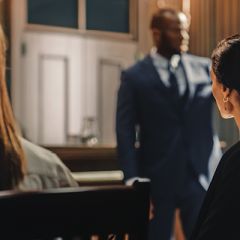 In his fifth and final article in his five-part Illinois Bar Journal series on trial advocacy, Gino L. DiVito focuses on the losing argument, which he says possess a unique status within trial advocacy. In his article, “What I Learned From Teaching Trial Advocacy: The Closing Argument,” published in the IBJ’s February issue, DiVito writes, closing arguments “occupy the climactic arguments in books, plays, movies, stories, and real trials. But persuasion does not magically occur based on the power of closing arguments. If you haven’t done the job of persuasion from the opening gun—if, during the other parts of trial, jurors haven’t accompanied you on the road toward victory—persuasion is unlikely to result from your closing arguments. … Nonetheless, closing arguments deservedly earn the mystique they generate.”
In his fifth and final article in his five-part Illinois Bar Journal series on trial advocacy, Gino L. DiVito focuses on the losing argument, which he says possess a unique status within trial advocacy. In his article, “What I Learned From Teaching Trial Advocacy: The Closing Argument,” published in the IBJ’s February issue, DiVito writes, closing arguments “occupy the climactic arguments in books, plays, movies, stories, and real trials. But persuasion does not magically occur based on the power of closing arguments. If you haven’t done the job of persuasion from the opening gun—if, during the other parts of trial, jurors haven’t accompanied you on the road toward victory—persuasion is unlikely to result from your closing arguments. … Nonetheless, closing arguments deservedly earn the mystique they generate.”

